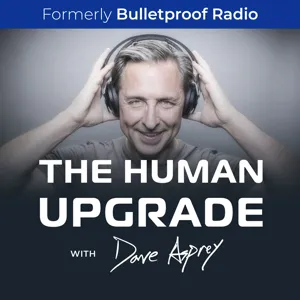Podcast Summary
Children not prioritized for COVID-19 vaccines yet due to ongoing clinical trials: Children, though less likely to get sick from COVID-19, can still develop severe conditions and even die from it. Clinical trials for their vaccines are ongoing, and parents should stay informed for their protection.
While the focus on vaccinations has been on adults due to their higher risk of severe COVID-19 symptoms, about a quarter of the US population, which are children, have not been prioritized yet for vaccinations. This is because clinical trials have not been completed to determine the safety and effectiveness of COVID-19 vaccines in children. The reason for this is that children, especially younger ones, are less likely to get sick from COVID-19 compared to adults. However, it's important to note that while most children experience mild or no symptoms, some can develop severe conditions and even die from the virus. As of now, there have been around 250 deaths in children related to COVID-19, which is a small fraction compared to the over 500,000 deaths in adults. Therefore, while the end of the pandemic may be in sight for adults, parents should continue to monitor the progress of vaccine trials for children to ensure their protection.
Children's role in coronavirus spread: Children, making up a quarter of the population, contribute to the spread of coronavirus despite transmitting it less efficiently than adults. Vaccinating them is necessary for herd immunity, even though adults are prioritized currently.
Children play a significant role in the spread of the coronavirus, despite transmitting it less efficiently than adults. This means that even if all adults are vaccinated, herd immunity cannot be achieved without vaccinating children as well. Currently, it's not a major concern since adults are prioritized for vaccinations due to their higher risk of severe illness and hospitalization. However, it's crucial to recognize that children make up a quarter of the population, and their vaccination is necessary to reach the 80% vaccination rate needed for herd immunity. The reason younger children transmit the virus less efficiently is not yet fully understood, but theories suggest it may be due to their social behavior or other factors. Overall, while the focus on vaccinations has been on adults, it's essential to acknowledge the role children play in the pandemic's spread and the importance of vaccinating them eventually.
Navigating the Road to Herd Immunity for Children: Parents await results of clinical trials for Pfizer and Moderna's COVID-19 vaccines in children, with safety and efficacy concerns influencing their decisions. Vaccines for younger children may not be available until year-end.
Achieving herd immunity against COVID-19 requires vaccinating children, but the timeline for vaccinating most children in the United States is uncertain. Pfizer and Moderna are conducting clinical trials for their vaccines in children 12 and older, with results expected by summer. Trials for younger children will follow, but results and vaccines may not be available until the end of the year. Parents may hesitate to vaccinate their children due to the low risk of severe illness and potential side effects. Companies must demonstrate the safety and efficacy of the vaccines to alleviate concerns. The situation puts the onus on parents to make informed decisions based on available information. As a parent and science journalist, I intend to vaccinate my children once it's proven safe and effective. The road to herd immunity involves navigating complex challenges, including the timeline for vaccine availability and addressing parental hesitancy.
Planning for Fall Reopening with Masks: Despite vaccines, masks are necessary for fall reopening due to risk of transmission, even for vaccinated adults traveling internationally, and herd immunity may eventually end the need for masks but not immediately.
Even though vaccines are safe, effective, and necessary to end the pandemic, there will be a significant time gap before children can be vaccinated. This means that schools should still plan to reopen in the fall, but masks will continue to be necessary for both teachers and students due to the risk of transmission. Additionally, vaccinated adults may still need to avoid traveling internationally with unvaccinated children, as rules may soon require proof of vaccination for travelers. Herd immunity may be the only way to eventually stop wearing masks. However, not every adult will be vaccinated, so masks will remain important for protecting vulnerable individuals.
Staying Safe Amid Declining COVID-19 Cases and Vaccine Rollout: Though COVID-19 cases are decreasing and vaccines are being distributed, it's crucial to continue safety measures to protect unvaccinated individuals and prevent virus spread, especially when traveling to high-risk countries.
Despite the optimism surrounding the decline in COVID-19 infection rates and the rollout of vaccines, it's important for individuals, especially those with unvaccinated children or older relatives, to continue taking precautions. Traveling to countries with high virus variants, such as Morocco, could put children and vaccinated adults at risk of contracting and spreading the virus. Even if grandparents are vaccinated, there's still a risk they could get infected and potentially pass it on to their unvaccinated grandchildren. The most effective vaccines offer protection to 90% of people, but there's still a chance of getting sick. Therefore, it's crucial to continue wearing masks, practicing social distancing, and taking other precautions to minimize the risk of transmission. While it's understandable that people miss personal interactions, it's essential to prioritize safety as much as possible.
COVID-19: US Faces Possibility of Fourth Wave by Mid-March: Despite vaccine progress, continuing preventive measures is crucial to minimize the impact of a potential fourth COVID-19 wave in the US. New data shows a significant decline in US life expectancy, especially for Black Americans.
The ongoing COVID-19 situation in the United States is not yet under control, and there's a possibility of a fourth wave due to the dominance of the B117 variant by mid-March. This underscores the importance of continuing preventive measures like washing hands, wearing masks, and social distancing. Despite the progress in vaccinations, children will not be vaccinated in significant numbers by spring, making it impossible to prevent the wave entirely. However, minimizing its impact is within our control. Meanwhile, new data shows that life expectancy in the US has dropped by a full year due to the pandemic, with black Americans experiencing an even more significant decline. On a positive note, the Biden administration has introduced a plan to overhaul the immigration system, which could represent the most significant changes in immigration law in over 30 years. Lastly, Perseverance, NASA's rover, is currently heading towards its target on Mars.
NASA lands most advanced rover on Mars to search for signs of ancient life: NASA's latest rover, Perseverance, landed on Mars to explore a water-filled crater for potential signs of ancient microbial life, marking a significant step towards answering the question of whether there was ever life on Mars.
NASA has successfully landed its most advanced rover, named Perseverance, on Mars to search for signs of ancient microbial life. This rover will focus its exploration on a crater that was once filled with water, where scientists believe there could be remnants of past Martian life in the form of sediments. This ambitious project marks NASA's most significant step towards answering the question of whether there was ever life on Mars. The daily news podcast was produced by Alexandra Lee Young, with assistance from Austin Mitchell. It was edited by MJ Davis Lin, Paige Kowatt, and Lisa Chow, and engineered by Chris Wood. Stay tuned for more updates on this exciting discovery.






